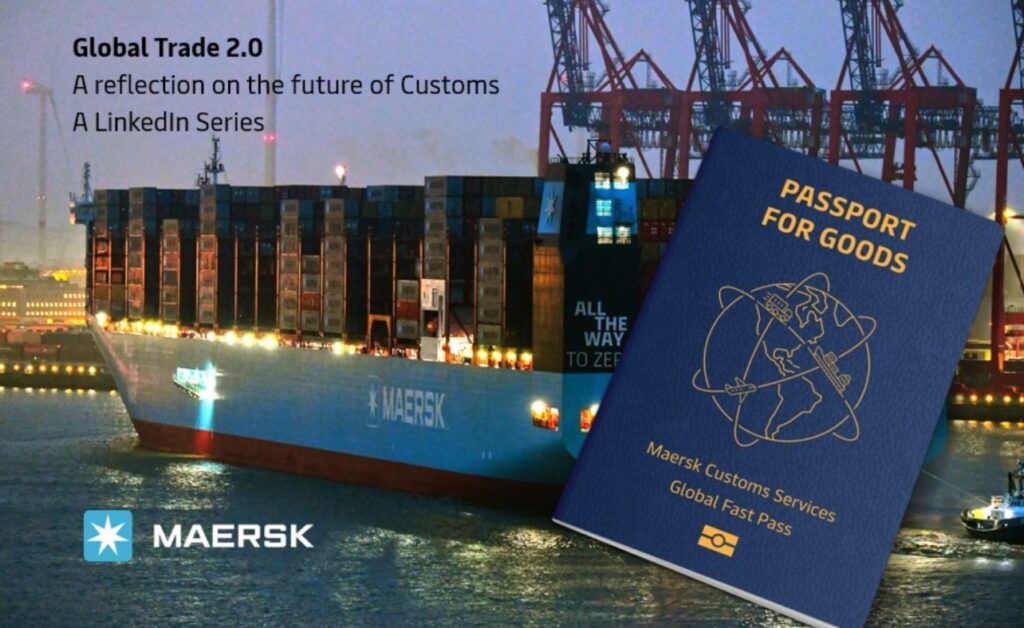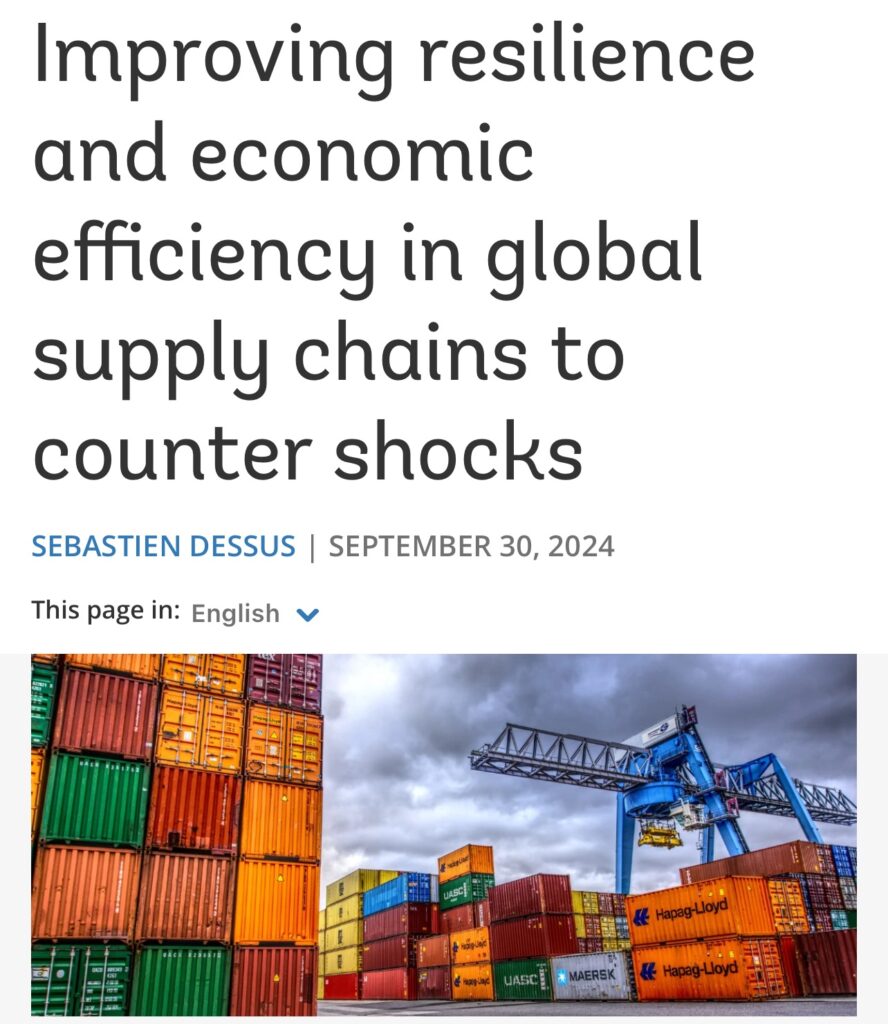The Royal Swedish Academy of Science has todau announced tve award of the Nobel Prize in Physics 2024 to:

John J. Hopfield
Princeton University, NJ, USA
Geoffrey E. Hinton
University of Toronto, Canada
“for foundational discoveries and inventions that enable machine learning with artificial neural networks”

This year’s two Nobel Laureates in Physics have used tools from physics to develop methods that are the foundation of today’s powerful machine learning. John Hopfield created an associative memory that can store and reconstruct images and other types of patterns in data. Geoffrey Hinton invented a method that can autonomously find properties in data, and so perform tasks such as identifying specific elements in pictures.
We all know what it means in speed and comfort to pass through fast-track immigration at borders using automatic passport readers when travelling. Would you like the same for your goods? The answer is easy to give.

International trade is going through an unprecedented period of duress. Since we know that trade is a driver peace, growth and prosperity, it is of outmost importance that our generation use all of our joint abilities to make international trade more resilient, fair and inclusive. At the same time there are never before seen challenges in relation our environment, sustainability, geopolitical tensions, social protection, trade wars, conflicts and black swan incidents – all impacting global trade. In essence we need a new paradigm combining efficient international trade with efficient trade compliance. We need trade facilitation and trade digitalization to build a bridge to a new environment of responsible and trusted trade.
Data and Trust
In this LinkedIn series of articles, I have during this year explored a new trade landscape emerging, what is called Global Trade 2.0 (GT2). This new paradigm is built by four pillars, namely, (I) Trade digitalization and Data, (II) International Framework Legislation, Agreements and Harmonization, (III) Use of existing trade infrastructure for multiple purposes (systems, models, certifications, commercial data pipelines) and (IV) Trust. Trust being the most important element.
In this context it is important to repeat that trust is never given, it is earned. Documented earned trust through trade compliance records and proven compliant behaviour should always be acknowledged and rewarded.
We need to create a supervised ecosystem of trust through the use of Trusted Value Chains supported by intelligent Digital Trade Corridors.
The second key element of GT2 is data. We are the first generation that can transform problems to opportunities through information technology.
As trade data becomes more digital, it is important to re-engineer trade process before different trade documents are digitized. Many trade documents currently in use are obsolete in the digital age and should be eliminated rather than digitized. This will make trade simpler and more efficient for all stakeholders. Data and trust are the enablers for a new international trade paradigm.
A call for change
My colleague and friend Marco Forgione, Director General of the UK Chartered Institute of Export and International Trade, has recently in United Kingdom called out to establish a new Trusted Trade system. In an article to UK Government he has made the following statement, repeated afterwards in various public appearances:
‘Trusted trade systems that prioritise reliability, transparency and resilience are essential. The Chartered Institute urges the government to take the lead in shaping a strategy that strengthens the trustworthiness of international trade. This strategy must focus on creating resilient, robust supply chains, forging dependable partnerships and establishing an industrial strategy that integrates comprehensive import and export plans.
Trusted trade offers a more balanced and ethical alternative. Rather than relying solely on open markets and deregulation, trusted trade emphasises qualified partnerships grounded in mutual respect, transparency and shared goals. It is a model designed to ensure that all participants in the global economy—regardless of their size or power—can benefit equitably from trade.
Trusted Trade is a wide term covering many aspects of international trade, but this call-out is asking for the framework for it.
A Trust Badge for trade is needed
Where we have seen in other areas the introduction of the Digital Product Passport (DPP), with digital sustainability data of the lifecycle of physical products, which, in combination with GS1 standards, allows companies to verify, manage and make visible the sustainability of your product in practice in a relatively complicated process, we have not seen the same development yet in relation to international trade movements. For trade it would have to be a more applicable process for all type of traders and stakeholders.
I believe it is time to change that in the years to come, and what we need is an international trade Passport for Goods.
A ‘trust badge’ combining the essential elements for movement of goods, namely validated identity of the people, the goods, the information flow and the financial stream – merged into a goods identity, following the entire value chain in a logic and simplified way is the basic path to go and platform to use to create this goods passport.
On the way
The international transport industry is already transforming to integrated end-to-end services. Maersk is one of the leaders of this trend, having already re-defined our purpose to become an integrator of trade, ‘improving life for all, by integrating the world’.
Today the industry is collecting data directly from source across all stages of global supply chains. The data is validated, refined, analysed, used and re-used throughout the supply chain, providing consistent and compliant reporting. These commercial trade data pipelines are, in turn, shaping the foundations for Trusted Trade Lanes, Trusted Supply and Value Chains, and intelligent Digital Trade Corridors that involve all stakeholders.
The next step is connecting these commercial data pipelines and to government agencies to maximize the predictability and resilience of safe and secure supply chains.
In the past, there have been doubts as to whether the private sector is willing to share more non-obligatory data with governments. There are many examples today of how, with the right incentives and benefits in place, that safe and secure exchange of data is possible.
Smart Containers provide 24/7 data on goods container parameters, including access history, temperature, movement, and humidity. These efficient track and trace systems offer real time supervision of goods and digital auditability. There are other existing technologies today that in open standards can be used as well for goods supervision, it is really a choice of the trader to decide.
When these supervision systems are combined with commercial supply chain visibility data from all stakeholders, a trust badge – a passport for goods – has been created.
Sharing the trust badge for greater good of all
The trust badge, an international digital trade passport for goods, could and should be voluntarily shared with government agencies to enhance the risk management process and access to simplifications before the border, at the border, and after crossing the border.
This also means that digital compliance records are being created by industry, compliance records that attached to the trust badge will be voluntarily shared, in a safe and secure way using open platform standards, with border agencies and other identified supply chain stakeholders.
Trusted Value Chains generates automated early warning signals to border agencies when something is wrong, creating a new environment for smart border application and improving the possibilities for new levels of trade facilitation.
Voluntary access to supply chain visibility data creates a new paradigm for smarter risking at borders. As a result, borders become safer, more predictable, and more resilient. This means that both large enterprise and MSMEs can engage in international trade at a lower cost, more competitively, and with a smaller carbon footprint. It also means that MSMEs are able to do international trade and to become integrated parts of global value chains – trade and business they are not able to do today.
As asked in the beginning of this article: Do you want a passport for goods to ensure end-to-end compliance and to guarantee last mile delivery in a safe and secure way? The answer is easy, right?
If so, start preparing. It will be here soon, and I know how you can get yours.
Global supply chains have been hit by an unprecedented barrage of shocks, from the COVID-19 pandemic, through attacks on Red Sea shipping, climate events, or port strikes.

In his latest blog post, the World Bank’s Sébastien Dessus considers the lessons learned. Among them: International organizations have an important role to play by promoting innovative solutions to improve the reliability, interoperability, and predictability of value chains and developing analytical tools to anticipate stress.
Read it here: https://blogs.worldbank.org/en/trade/improving-resilience-and-economic-efficiency-in-global-supply-ch






You must be logged in to post a comment.